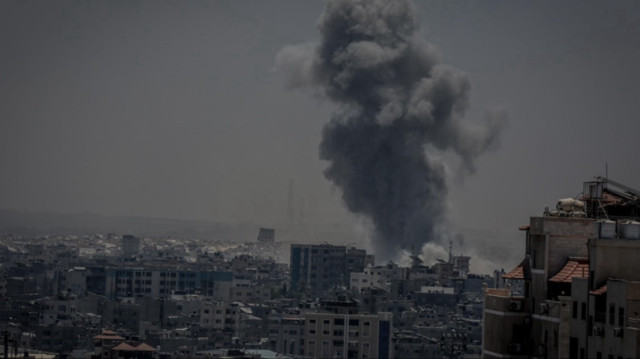
Israeli Security Cabinet will discuss Hamas's response Saturday night, as Tel Aviv has not outright rejected Hamas's reply, says public broadcaster
The Israeli government has decided to send a delegation to the Qatari capital of Doha as part of ongoing mediation efforts with Hamas over a prisoner swap deal and a ceasefire in the Gaza Strip, the state-run Israeli broadcaster KAN reported on Saturday.
The Israeli Broadcasting Authority (KAN) indicated that Israel is likely to send the delegation on Sunday.
An unnamed senior Israeli official told Channel 12 that Israeli Prime Minister Benjamin Netanyahu "decided to send a negotiation delegation to Doha to discuss the amendments Hamas requested on the ceasefire proposal."
On Friday evening, Hamas said it had submitted its response to the mediators regarding the proposal after conducting internal consultations with Palestinian factions and forces.
Hamas described its response to the proposal as “positive” and confirmed its “serious readiness to immediately enter a round of negotiations on the mechanism for implementing” the proposal.
According to KAN, the Israeli Security Cabinet will discuss Hamas's response Saturday night, and Israel has not outright rejected Hamas's reply.
KAN quoted informed, unnamed sources as saying that the mediators are “optimistic about bridging the gaps between the two sides, with the amendments Hamas requested on the proposal.”
Israeli officials claimed that the change in Hamas's position came as a result of significant pressure exerted by Qatar and the US, although mediators did not confirm this.
The sources confirmed that “the response Israel received contains points that can be built upon,” without providing further details.
Meanwhile, the Israeli newspaper Yedioth Ahronoth quoted another unnamed Israeli official saying that the delegation will hold “proximity talks” with the mediators regarding the deal.
Channel 13 also reported that estimates in Israel indicated that the expected timeline for signing the prisoner exchange deal with Hamas could extend until the end of the current week.
The official sources concerned have not spoken about the details of the proposal, but Israeli media, including Haaretz, reported that its main provisions include Hamas releasing half of the Israeli hostages (10 hostages), in addition to the bodies of 18 hostages in five stages during a 60-day ceasefire.
According to the Israeli newspaper, the proposal includes releasing eight Israeli hostages on the first day the agreement comes into effect and two on the fiftieth day.
It also includes handing over five bodies of Israeli prisoners on the 7th day, five bodies on the 13th day, and eight bodies on the 16th day.
In return, Israel would release a large number of Palestinian prisoners it holds and gradually withdraw its forces from agreed-upon areas inside Gaza, a point that could cause disagreement with Tel Aviv, which demands Hamas' disarmament and the exile of its leaders abroad.
Hamas has not revealed the contents of its response to the proposal. However, the KAN reported, citing informed and unnamed sources, that Hamas continues to insist on three major demands to amend the terms of the agreement.
The sources added that the first demand concerns returning to the previous model of humanitarian aid distribution, and the second concerns what happens after the 60-day ceasefire period. While Israel believes that ending the period without an agreement leads to the resumption of the war, Hamas insists on extending the ceasefire even without a final agreement.
The third demand focuses on the map of the Israeli army's withdrawal from Gaza, as Hamas demands a clear and tangible withdrawal from the areas where the military is currently deployed inside the Strip.
Netanyahu is scheduled to leave for Washington on Sunday morning to meet with US President Donald Trump, according to Haaretz.
Tel Aviv estimates that there are 50 hostages, 20 of whom are held captive in Gaza, and that over 10,400 Palestinians are held in its prisons, subjected to torture, starvation, and medical neglect, which has resulted in many deaths, according to Palestinian and Israeli human rights and media reports.
Despite international calls for a ceasefire, Israel has pursued a genocidal war on Gaza, killing more than 57,300 Palestinians, most of them women and children, since October 2023.
The International Criminal Court issued arrest warrants last November for Netanyahu and his former Defense Minister Yoav Gallant for war crimes and crimes against humanity in Gaza.
Israel also faces a genocide case at the International Court of Justice for its war on the enclave.







